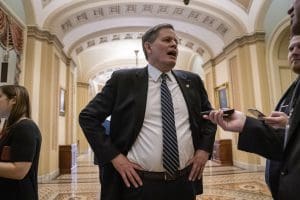Senate Republicans push misleading attacks on $3.5 trillion investment plan
Democrats are seeking substantial investments in climate, caregiving, and other ‘human’ infrastructure.

Senate Republicans launched a series of misleading attacks on Democrats’ $3.5 trillion investment plan on Tuesday, which aims to fund the so-called “human infrastructure” elements President Joe Biden was forced to remove from his initial infrastructure plan, to enable lawmakers to move that legislation across the finish line.
“How to describe the Democrats’ $3.5 trillion tax and spending spree in three words?” Montana Sen. Steve Daines tweeted. “I’ll go first: Reckless. Radical. Unprecedented.”
Daines was referencing the budget resolution authored by Budget Committee Chair Bernie Sanders for fiscal year 2022 and beyond. Senate Democrats voted 50-49, along party lines, to begin debate on the package on Tuesday.
If passed, it will enable the Democratic majority to enact many of Biden’s spending proposals and tax changes with just a simple majority.
The $3.5 trillion reconciliation package is expected to incorporate many of the climate and clean energy infrastructure priorities from Biden’s American Jobs Plan, and the free community college, universal pre-K education, paid leave, and expanded health insurance coverage provisions from his American Families Plan. It would likely include tax increases on those making $400,000 or more and corporations to pay for the deal, and would extend the child tax credits that were expanded earlier this year in the pandemic relief package.
Several of Daines’ Republican colleagues quickly offered their own attacks on the plan in similar three-word reactions.
“Nothing for defense,” said Oklahoma Sen. Jim Inhofe.
“Too. Much. Money,” Alabama Sen. Tommy Tuberville wrote.
“Hasty. Massive. Dangerous,” North Dakota Sen. Kevin Cramer tweeted.
Idaho Sen. Jim Risch dubbed it “Careless. Wasteful. Senseless,” while Kansas Sen. Jerry Moran described it as “Bernie’s wish list.”
Florida Sen. Rick Scott used his favorite catch phrase for any Democratic legislation, tweeting: “I only need two: Systemic socialism.”
“Inflation. Inflation. Inflation,” warned West Virginia Sen. Shelley Moore Capito.
Oklahoma Sen. James Lankford called it the “Democrats’ Debt Bomb.”
Sen. Cindy Hyde-Smith of Mississippi even claimed that the $3.5 trillion package was in fact “Four. Trillion. Dollars.”
Many of these claims are easily debunked.
Contrary to Inhofe’s assertions, the budget expressly says it will determine the “appropriate levels of new budget authority and outlays” for defense for 2022 through 2031.
Though Republicans have taken to using the term “socialism” to describe anything they don’t like, providing tax cuts and affordable child care to help people go back to work is nowhere close to the term’s definition.
While the post-pandemic boom under Biden has caused some inflation, the White House has called this “temporary” and Federal Reserve Chair Jerome Powell agreed the inflation it will “wane over time.” Democrats predict that increased federal investments like this package will lower “costs for working families” as well.
And while Republicans unanimously drew a “red line” against tax increases for billionaires and corporate behemoths, those cuts and other savings are expected to pay for much of the cost of the new investments — not new debt.
Though the legislation is not popular among GOP senators, it is quite popular among likely voters. Recent surveys showed large majorities of the American public — including pluralities of GOP voters — support the elements of the $3.5 trillion plan.
Published with permission of The American Independent Foundation.
Recommended

President Biden visits Prince William park to talk solar, youth involvement on Earth Day
Virginia set to receive $156 million from U.S. Environmental Protection Agency program
By Charlie Paullin, Virginia Mercury - April 23, 2024
Texas governor and attorney general do little to curb state’s chemical plant crisis
Republicans Greg Abbott and Ken Paxton have taken thousands of dollars in donations from chemical companies and their affiliated PACs.
By Jesse Valentine - December 08, 2023
‘We’ve been waiting for this’: Union workers cheer Biden’s hydrogen hub plan
Federal funding for the hub is estimated to bring over 20,000 jobs to the Pennsylvania-New Jersey-Delaware area.
By Anna Gustafson - October 17, 2023







































































